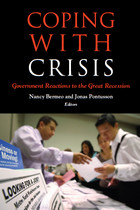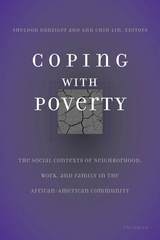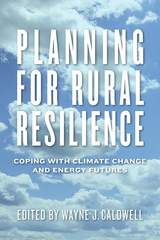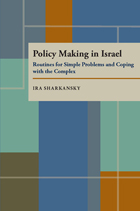
In Aesthetics of Grief and Mourning, philosopher Kathleen Marie Higgins reflects on the ways that aesthetics aids people experiencing loss. Some practices related to bereavement, such as funerals, are scripted, but many others are recursive, improvisational, mundane—telling stories, listening to music, and reflecting on art or literature. Higgins shows how these grounding, aesthetic practices can ease the disorienting effects of loss, shedding new light on the importance of aesthetics for personal and communal flourishing.

Currently, 1.7 million Americans are either blind or are in the process of losing their vision. Sightless himself and a veteran of four decades of helping people cope with blindness as well as with the possibility of blindness, Alvin Roberts decided that telling stories drawn from the community of the blind and from his fellow rehabilitation workers was the best way to reassure others—especially the elderly, who are most at risk of becoming visually impaired—that "blindness need not be the end of active life, but rather the beginning of a life in which [people] will depend on their residual senses to continue full, active living."
Through good stories well told, then, Roberts offers reassurance that competent help exists for the visually impaired. He chooses stories that demonstrate to those facing blindness that they, too, can learn to cope because others have done so. Yet that is only part of his message. Seeing humor as a great facilitator for successfully reentering mainstream society, Roberts also dispels the commonly held belief that blind people are a somber lot and that those who help them encounter little humor. Many of these stories are frankly funny, and blind people and those in the rehabilitation field certainly are not above practical jokes.
Roberts’s personal experiences and conversations with colleagues have provided a wealth of incidents on which to base stories of rehabilitation workers with the blind going about their daily tasks. He paints a positive picture of what it is like to be blind, replacing fear, dread, and myth with reality.


Only by understanding the enduring poverty of Brazil can one hope to understand the recent growth of Protestant evangelical churches there, Cecília Loreto Mariz contends. Her study investigates how religious groups support individualism and encourage the poor to organize. Groups with shared values are then able to develop strategies to cope with poverty and, ultimately, to transform the social structure.
Interviews with members and leaders of religious groups, accounts of meetings, and close readings of religious literature contribute to a realistic account of Christian base communities and Assembly of God churches, folk Catholic tradition, and Afro Brazilian Spiritism.

Contributors use qualitative research methods to explore the influence of community, workplace, and family upon strategies for dealing with poverty. Promising young scholars delve into poor black inner-city neighborhoods and suburbs and middle-income black urban communities, exploring experiences at all stages of life, including high-school students, young parents, employed older men, and unemployed mothers. Two chapters discuss the role of qualitative research in poverty studies, specifically examining how this research can be used to improve policymaking.
The volume's contribution is in the diversity of experiences it highlights and in how the general themes it illustrates are similar across different age/gender groups. The book also suggests an approach to policymaking that seeks to incorporate the experiences and the needs of the poor themselves, in the hope of creating more successful and more relevant poverty policy. It is especially useful for undergraduate and graduate courses in sociology, public policy, urban studies, and African-American Studies, as its scope makes it THE basic reader of qualitative studies of poverty.
Sheldon Danziger is Director of the Poverty Research and Tranining Center and Professor of Social Work and Public Policy, University of Michigan. Ann Chih Lin is Assistant Professor of Political Science and Public Policy, University of Michigan.





All governments face problems and are judged by their ability to solve them and the policies they develop in doing so. Compared with other Western democracies, Israel has faced a devastating number of problems of unusual severity in a relatively short time: war, terrorism, heavy immigration, unsettled boundaries, economic stresses, internal disputes about ethnicity and religion, and the lingering scars of the Holocaust and other persecutions. Sharkansky’s analysis of the Israeli government’s routines and methods for coping with such an array of difficulties, from simple to complex to intractable, offers general insights into how governments make policy in a democracy.

The wildfires that spread across Southern California in the fall of 2003 were devastating in their scale-twenty-two deaths, thousands of homes destroyed and many more threatened, hundreds of thousands of acres burned. What had gone wrong? And why, after years of discussion of fire policy, are some of America's most spectacular conflagrations arising now, and often not in a remote wilderness but close to large settlements?
That is the opening to a brilliant discussion of the politics of fire by one of the country's most knowledgeable writers on the subject, Stephen J. Pyne. Once a fire fighter himself (for fifteen seasons, on the North Rim of the Grand Canyon) and now a professor at Arizona State University, Pyne gives us for the first time a book-length discussion of fire policy, of how we have come to this pass, and where we might go from here.
Tending Fire provides a remarkably broad, sometimes startling context for understanding fire. Pyne traces the "ancient alliance" between fire and humanity, delves into the role of European expansion and the creation of fire-prone public lands, and then explores the effects wrought by changing policies of "letting burn" and suppression. How, the author asks, can we better protect ourselves against the fires we don't want, and better promote those we do?
Pyne calls for important reforms in wildfire management and makes a convincing plea for a more imaginative conception of fire, though always grounded in a vivid sense of fire's reality. "Amid the shouting and roar, a central fact remains," he writes. "Fire isn't listening. It doesn't feel our pain. It doesn't care-really, really doesn't care. It understands a language of wind, drought, woods, grass, brush, and terrain, and it will ignore anything stated otherwise."
We need to think about fire in more deeply biological ways and recognize ourselves as the fire creatures we are, Pyne argues. Even if, in recent times, "we have gone from being keepers of the flame to custodians of the combustion chamber," tending fire wisely remains our responsibility as a species. "The Earth's fire scene," he writes of us, "is largely the outcome of what this creature has done, and not done, and the species operates not according to strict evolutionary selection but in the realm of culture, which is to say, of choice and confusion."
Rich in insight, wide-ranging in its subject, and clear-eyed in its proposals, Tending Fire is for anyone fascinated by fire, fire policy, or human culture.
READERS
Browse our collection.
PUBLISHERS
See BiblioVault's publisher services.
STUDENT SERVICES
Files for college accessibility offices.
UChicago Accessibility Resources
home | accessibility | search | about | contact us
BiblioVault ® 2001 - 2024
The University of Chicago Press









